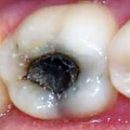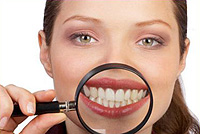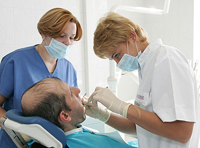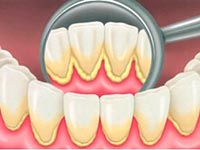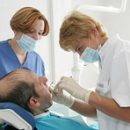In recent years, there has been a tendency to prevalence and the intensity of the development of the caries of dairy teeth, which is often detected in children aged 2-3 years, but in some cases it can occur in the kids under 2 years. What you need to know the parents to avoid such problems?
Content
Causes of damage to dairy teeth
As a rule, the early damage to the dairy teeth by caries is connected with
damage to the dental primaries in the intrauterine period. Formation
The embryo's dentities begin in the first trimester of pregnancy.
Therefore, the diseases of the future mother, transferred during this period, or reception
medicines can lead to a violation of the proper development of teeth
fruit.
At the heart of problems with teeth after their teething lies bad hygiene
oral cavity and irregular food habits. To the last, first of all,
It is necessary to attribute long-term use of the nipple. Children who are too
long can not go from a bottle on a drink from a cup or a rifle, and
especially kids who fall asleep every evening with a bottle of mouth,
exposed to a lot of risk of development of the so-called bottle
Caries.
In this form of the disease from long-term contact of the liquid from
Bottles (usually, if it is sweet) with teeth caries amazed
All front teeth, and the process spreads around the circle
coronal part of the tooth, i.e. around the whole visible part of the tooth
Perimeter.
And of course, the child under 3 years old should not have a snack between food,
Especially food containing a large amount of carbohydrates (chocolate,
Candy and Pr.). As sweets he is better to offer fruits,
Cookies, Drying, Baking, Marmalade, Fastil.
Sweet can be seated after breakfast or after dinner, and after that
Soon brittle teeth. After all, almost no child
can grow without sweets, only consumption of them should be
Reasonable and limited.
Signs of caries
In the depth of lesion, the caries of dairy teeth are divided into several types.
- Elementary - on enamel
White spots of various shapes and magnitude appear, there is no pain.
If you do not carry out treatment, the process progresses - stains become
Dark, brown, black. With timely treatment further
The development of caries can be suspended.
- Surface
- The defect of the tooth tissues is within the enamel. Carious cavity
may be bright or dark. Pain appears when exposed
Sweet, sour, salted. It is necessary to seal the cavity.
- Average
- Enamel of the tooth and part of dentin (tissue inside the tooth). Pain maybe
occur from sweet, salted, cold and hot. Necessary
Sealing cavity.
- Deep - The enamel of I
Most of Dentina. The treatment method depends on the state of the pulp
(Soft tooth fabrics): sealing or conservative treatment -
the use of therapeutic gaskets in combination with delayed
sealing.
For children, a multiple teeth defeat (affected
There may be all 20 dairy teeth). In addition, for children
age is characterized by the emergence of several carious cavities in one
tooth.
Also, some children are due to anatomical and physiological
The features of the structure of their teeth, the enamel layer and Dentin turns out to be thinner,
Solid tissues have high permeability, and all this leads to
the rapid distribution of the carious process not only on the surface
tooth, but also deep into. As a result, the process extends to more
Deep fabrics, and develop pulpitis and periodontitis.
Pulpitis is a disease in which soft tooth tissues (pulp)
turn out to be covered by inflammatory process. Clinical picture
Pulita can develop for several hours. Usually before
The child makes minor complaints, then an acute pain occurs
Mostly at night or pain from temperature stimuli.
Such complaints say that, most likely, carious cavity
So deep that he penetrated to the pulp of the tooth. Required immediate
Doctor intervention.
If the tooth ached repeatedly, there is swelling cheeks or gums, on
mucous membrane near the tooth there is a fistula (hole) with purulent
discontinued, observed pain when pricking to the tooth, then it means,
that the pathological process spread beyond the tooth and arose
periodontitis - inflammation of the tissues surrounding the tooth. The doctor will choose
tactics in the treatment of periodontitis individually, but most likely such
Milk tooth can not be cured and it must be removed.
Methods of treatment
At the initial stage of the development of caries in children can be applied
The method of silvering enamel, in which the unprocessed carious
The cavity is applied a special solution containing silver ions. How
Rule, he is a temporary measure in the fight against caries. In addition
The use of silver drugs occurs persistent tooth staining in
black color what does not look quite aesthetic.
To the most traditional ways of treating caries of dairy teeth
refers to the removal of the affected tissue of the tooth with the help of born
local anesthesia or without it. Decision on the need to use
local anesthesia doctor takes in each case individually.
Sometimes no persuasions help, and the child does not hear the arguments
Doctor and parents about the need «Open Rotik» or «show,
Pass teeth». As a rule, such a problem is characteristic of children 3 years
or for children suffering from concomitant diseases. Then arises
Question about the treatment of teeth under general anesthesia.
It is always important to remember that treatment under general anesthesia is only
One of the options that modern dentistry offers. This
The method should be applied strictly according to the testimony and cannot be worn
Mass character.
The child should not be afraid of a dentist, it is advisable to make friends with
him, to imbued with the need to treat teeth. After all, he will have to
face this problem throughout life. Much B
psychological setting depends on parents and close kids who
sometimes give him his own fear of dentists. Try
explain to the child the need to visit the dental doctor and set up
He is not afraid of this procedure.
Prevention
Caries can occur in children from the very early age, so
Preventive measures need to be carried out with the advent of the first
teeth.
You can prevent caries by removing meals from the oral cavity and
Microbial collapse with the help of oral hygiene. First of all, to
It includes a toothbrush and toothpaste.
Than to clean?
Opinions of specialists about when to start brushing teeth with
Paste, diverge. The taste of pasta may seem like a child unpleasant,
Therefore, the use of pasta is better to start after the first year of life.
Toothpaste in its composition must necessarily match
child age - information about it is on the package.
In a child up to 3
years pasta should not contain fluorine. At this age, children swallow
Most of the paste and do not know how to rinse your mouth. Fluorine is an active element,
and swallowing a large amount of pastor containing fluorine may
Cause serious consequences and requires immediate appeal to the doctor.
From 4 years, children are able to partially spin the remains of pasta after
Teeth cleaning procedures. That is why the toothpastes for this age
Contain fluorides. The process of ripening the enamel of the teeth is accelerated when
regular use of hygiene products containing active fluorine,
It has been proven that the risk of caries occur significantly reduced
teeth.
Toothbrushes for children are extremely diverse. For the very first
teeth will suit the brushes-inks, which mom can easily and gently
Remove dental flare with kid teeth.
By 2.5-3 years, the baby should be accepted to accustom to self-cleaning of the teeth, giving him a toothbrush to the handle.
How to clean?
Sometimes an attempt to clean your teeth can cause a negative reaction. Not
It is worth upset because of this. Need to gain patience and... play.
Child up to 3 years old, and later, knows the world through the game. Therefore, it is impossible
insist on cleaning teeth, hoping for what he understands how it is
important. You just need to play. For such a game, the brush is well suitable for
batteries with toy on the handle.
Movements made by a toothbrush must be different for different groups of teeth.
Front teeth are cleaning vertical unidirectional movements, from
gums. For cheeks - moves circular with closed teeth. Chewing
The surface of the teeth is cleaned with horizontal movements back and forth,
from the inside (from the side of the tongue and the sky) to the movements upstairs, as «Metelka».
Important not only what movements are committed, but also how much
Dedicated to this time. To control the adequacy of teeth cleaning
There are two ways:
- The first - in time (about 10 minutes to clean all the teeth), for which sandy or any other hours can be used;
- The second - in terms of the number of movements (5-6 movements on each site, brushed brushed).
Proper nutrition
Prevention of dental diseases includes also
Balanced nutrition, that is, such a meal in which food
Contains proteins, fats, carbohydrates, vitamins, minerals,
necessary for the right growth and formation of teeth tissues.
For babies it is, of course, breastfeeding. For children
Older - Introduction to the diet of all necessary types of supplies,
recommended for this age.
Also additional fluorine sources may be fluorinated
salt and water, for their application do not require any special
Indications.
The main sources of calcium are: fermented milk products, cheese,
Cottage cheese, potatoes, gooseberry, buckwheat, oats, roh, some species
Mineral water.
First visit to the dentist
The need for the first visit of the child to the dentist is usually
There is two reasons: Preventive inspection for admission to
preschool institution or complaints. In any case, the first visit
It is not worth postponing to the dentist if the child has already been 4 years old.
Attend the dentist you need 2 times a year. If the carious process
already started, then for such a term he will not have time to spread deeply,
The tooth will be preserved and there will not be complications of caries (pulpitis,
periodontitis).
In addition, the sooner the dentist detects caries,
painless and successful will be treatment, and in some cases
The initial stages of the surface caries will be able to do without
instrumental intervention by conducting treatment with
mineralizing agents, inflicting fluorine and calcium healing solutions on
Damaged sections of enamel.
The dentist holds not only the treatment of teeth, but also prophylactic
Events aimed at preserving teeth and gums healthy:
- Performs professional oral hygiene (removes the toothflight);
- Processes teeth with fluorine and calcium preparations;
- trains a small patient to proper teeth;
- If necessary, appoints a general treatment (receiving vitamin and mineral additives);
- Together with parents, the regime and the composition of the child's nutrition, reveals harmful habits;
- Conduct
Sealing Fissur (grooves on the chewing surface of the tooth). This is
Preventive event aimed at preventing occurrence
Caries in constant teeth.



